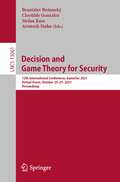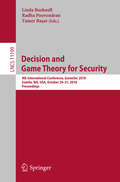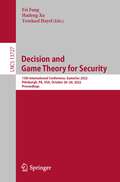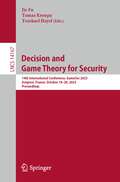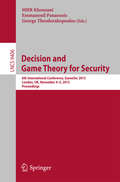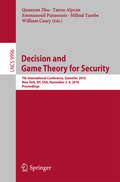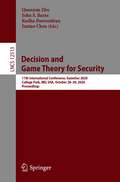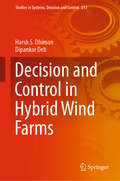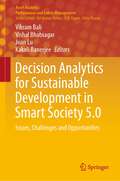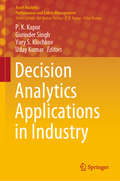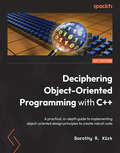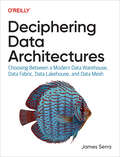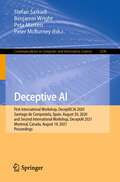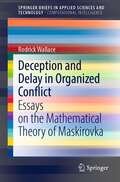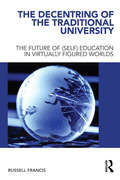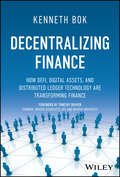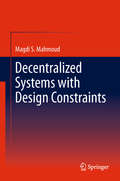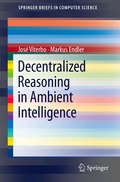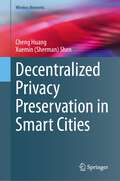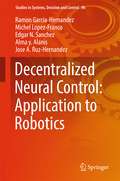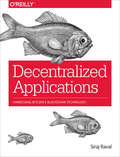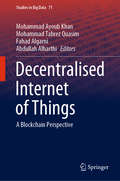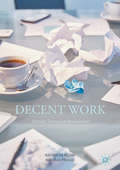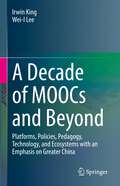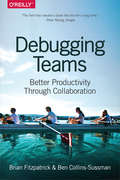- Table View
- List View
Decision and Game Theory for Security: 12th International Conference, GameSec 2021, Virtual Event, October 25–27, 2021, Proceedings (Lecture Notes in Computer Science #13061)
by Branislav Bošanský Cleotilde Gonzalez Stefan Rass Arunesh SinhaThis book constitutes the refereed proceedings of the 12th International Conference on Decision and Game Theory for Security, GameSec 2021,held in October 2021. Due to COVID-19 pandemic the conference was held virtually. The 20 full papers presented were carefully reviewed and selected from 37 submissions. The papers focus on Theoretical Foundations in Equilibrium Computation; Machine Learning and Game Theory; Ransomware; Cyber-Physical Systems Security; Innovations in Attacks and Defenses.
Decision and Game Theory for Security: 9th International Conference, GameSec 2018, Seattle, WA, USA, October 29–31, 2018, Proceedings (Lecture Notes in Computer Science #11199)
by Linda Bushnell Radha Poovendran Tamer BaşarThe 28 revised full papers presented together with 8 short papers were carefully reviewed and selected from 44 submissions.Among the topical areas covered were: use of game theory; control theory; and mechanism design for security and privacy; decision making for cybersecurity and security requirements engineering; security and privacy for the Internet-of-Things; cyber-physical systems; cloud computing; resilient control systems, and critical infrastructure; pricing; economic incentives; security investments, and cyber insurance for dependable and secure systems; risk assessment and security risk management; security and privacy of wireless and mobile communications, including user location privacy; sociotechnological and behavioral approaches to security; deceptive technologies in cybersecurity and privacy; empirical and experimental studies with game, control, or optimization theory-based analysis for security and privacy; and adversarial machine learning and crowdsourcing, and the role of artificial intelligence in system security.
Decision and Game Theory for Security: 13th International Conference, GameSec 2022, Pittsburgh, PA, USA, October 26–28, 2022, Proceedings (Lecture Notes in Computer Science #13727)
by Fei Fang Haifeng Xu Yezekael HayelThis book constitutes the refereed proceedings of the 13th International Conference on Decision and Game Theory for Security, GameSec 2022, held in October 2022 in Pittsburgh, PA, USA. The 15 full papers presented were carefully reviewed and selected from 39 submissions. The papers are grouped thematically on: deception in security; planning and learning in dynamic environments; security games; adversarial learning and optimization; novel applications and new game models.
Decision and Game Theory for Security: 14th International Conference, GameSec 2023, Avignon, France, October 18–20, 2023, Proceedings (Lecture Notes in Computer Science #14167)
by Jie Fu Tomas Kroupa Yezekael HayelThis book constitutes the refereed proceedings of the 14th International Conference on Decision and Game Theory for Security, GameSec 2023, held in Avignon, France, during October 18–20, 2023.The 19 full papers and 4 short papers included in this book were carefully reviewed and selected from 33 submissions. They were organized in topical sections as follows: Mechanism design and imperfect information, Security Games, Learning in security games, Cyber deception, Economics of security, Information and privacy and Short articles.
Decision and Game Theory for Security
by Mhr Khouzani Emmanouil Panaousis George TheodorakopoulosThis book constitutes the refereed proceedings of the 6th International Conference on Decision and Game Theory for Security, GameSec 2015, held in London, UK, in November 2015. The 16 revised full papers presented together with 5 short papers were carefully reviewed and selected from 37 submissions. Game and decision theory has emerged as a valuable systematic framework with powerful analytical tools in dealing with the intricacies involved in making sound and sensible security decisions. For instance, game theory provides methodical approaches to account for interdependencies of security decisions, the role of hidden and asymmetric information, the perception of risks and costs in human behaviour, the incentives/limitations of the attackers, and much more. Combined with our classical approach to computer and network security, and drawing from various fields such as economic, social and behavioural sciences, game and decision theory is playing a fundamental role in the development of the pillars of the "science of security".
Decision and Game Theory for Security
by Quanyan Zhu Tansu Alpcan Emmanouil Panaousis Milind Tambe William CaseyThis book constitutes the refereed proceedings of the 6th International Conference on Decision and Game Theory for Security, GameSec 2015, held in London, UK, in November 2015. The 16 revised full papers presented together with 5 short papers were carefully reviewed and selected from 37 submissions. Game and decision theory has emerged as a valuable systematic framework with powerful analytical tools in dealing with the intricacies involved in making sound and sensible security decisions. For instance, game theory provides methodical approaches to account for interdependencies of security decisions, the role of hidden and asymmetric information, the perception of risks and costs in human behaviour, the incentives/limitations of the attackers, and much more. Combined with our classical approach to computer and network security, and drawing from various fields such as economic, social and behavioural sciences, game and decision theory is playing a fundamental role in the development of the pillars of the "science of security".
Decision and Game Theory for Security: 11th International Conference, GameSec 2020, College Park, MD, USA, October 28–30, 2020, Proceedings (Lecture Notes in Computer Science #12513)
by Quanyan Zhu John S. Baras Radha Poovendran Juntao ChenThis book constitutes the refereed proceedings of the 11th International Conference on Decision and Game Theory for Security, GameSec 2020,held in College Park, MD, USA, in October 2020. Due to COVID-19 pandemic the conference was held virtually The 21 full papers presented together with 2 short papers were carefully reviewed and selected from 29 submissions. The papers focus on machine learning and security; cyber deception; cyber-physical systems security; security of network systems; theoretic foundations of security games; emerging topics.
Decision and Control in Hybrid Wind Farms (Studies in Systems, Decision and Control #253)
by Harsh S. Dhiman Dipankar DebThis book focuses on two of the most important aspects of wind farm operation: decisions and control. The first part of the book deals with decision-making processes, and explains that hybrid wind farm operation is governed by a set of alternatives that the wind farm operator must choose from in order to achieve optimal delivery of wind power to the utility grid. This decision-making is accompanied by accurate forecasts of wind speed, which must be known beforehand. Errors in wind forecasting can be compensated for by pumping power from a reserve capacity to the grid using a battery energy storage system (BESS). Alternatives based on penalty cost are assessed using certain criteria, and MCDM methods are used to evaluate the best choice. Further, considering the randomness in the dynamic phenomenon in wind farms, a fuzzy MCDM approach is applied during the decision-making process to evaluate the best alternative for hybrid wind farm operation. Case studies from wind farms in the USA are presented, together with numerical solutions to the problem. In turn, the second part deals with the control aspect, and especially with yaw angle control, which facilitates power maximization at wind farms. A novel transfer function-based methodology is presented that controls the wake center of the upstream turbine(s); lidar-based numerical simulation is carried out for wind farm layouts; and an adaptive control strategy is implemented to achieve the desired yaw angle for upstream turbines. The proposed methodology is tested for two wind farm layouts. Wake management is also implemented for hybrid wind farms where BESS life enhancement is studied. The effect of yaw angle on the operational cost of BESS is assessed, and case studies for wind farm datasets from the USA and Denmark are discussed. Overall, the book provides a comprehensive guide to decision and control aspects for hybrid wind farms, which are particularly important from an industrial standpoint.
Decision Analytics for Sustainable Development in Smart Society 5.0: Issues, Challenges and Opportunities (Asset Analytics)
by Vikram Bali Vishal Bhatnagar Joan Lu Kakoli BanerjeeThis book covers sustainable development in smart society’s 5.0 using data analytics. The data analytics is the approach of integrating diversified heterogeneous data for predictive analysis to accredit innovation, decision making, business analysis, and strategic decision making. The data science brings together the research in the field of data analytics, online information analytics, and big data analytics to synthesize issues, challenges, and opportunities across smart society 5.0. Accordingly, the book offers an interesting and insightful read for researchers in the areas of decision analytics, cognitive analytics, big data analytics, visual analytics, text analytics, spatial analytics, risk analytics, graph analytics, predictive analytics, and analytics-enabled applications.
Decision Analytics Applications in Industry (Asset Analytics)
by Uday Kumar P. K. Kapur Gurinder Singh Yury S. KlochkovThis book presents a range of qualitative and quantitative analyses in areas such as cybersecurity, sustainability, multivariate analysis, customer satisfaction, parametric programming, software reliability growth modeling, and blockchain technology, to name but a few. It also highlights integrated methods and practices in the areas of machine learning and genetic algorithms. After discussing applications in supply chains and logistics, cloud computing, six sigma, production management, big data analysis, satellite imaging, game theory, biometric systems, quality, and system performance, the book examines the latest developments and breakthroughs in the field of science and technology, and provides novel problem-solving methods. The themes discussed in the book link contributions by researchers and practitioners from different branches of engineering and management, and hailing from around the globe. These contributions provide scholars with a platform to derive maximum utility in the area of analytics by subscribing to the idea of managing business through system sciences, operations, and management. Managers and decision-makers can learn a great deal from the respective chapters, which will help them devise their own business strategies and find real-world solutions to complex industrial problems.
Deciphering Object-Oriented Programming with C++: A practical, in-depth guide to implementing object-oriented design principles to create robust code
by Dorothy R. KirkEmbrace object-oriented programming and explore language complexities, design patterns, and smart programming techniques using this hands-on guide with C++ 20 compliant examplesKey FeaturesApply object-oriented design concepts in C++ using direct language features and refined programming techniquesDiscover sophisticated programming solutions with nuances to become an efficient programmerExplore design patterns as proven solutions for writing scalable and maintainable C++ softwareBook DescriptionEven though object-oriented software design enables more easily maintainable code, companies choose C++ as an OO language for its speed. Object-oriented programming in C++ is not automatic – it is crucial to understand OO concepts and how they map to both C++ language features and OOP techniques. Distinguishing your code by utilizing well-tested, creative solutions, which can be found in popular design patterns, is crucial in today's marketplace. This book will help you to harness OOP in C++ to write better code.Starting with the essential C++ features, which serve as building blocks for the key chapters, this book focuses on explaining fundamental object-oriented concepts and shows you how to implement them in C++. With the help of practical code examples and diagrams, you'll learn how and why things work. The book's coverage furthers your C++ repertoire by including templates, exceptions, operator overloading, STL, and OO component testing. You'll discover popular design patterns with in-depth examples and understand how to use them as effective programming solutions to solve recurring OOP problems.By the end of this book, you'll be able to employ essential and advanced OOP concepts to create enduring and robust software.What you will learnQuickly learn core C++ programming skills to develop a base for essential OOP features in C++Implement OO designs using C++ language features and proven programming techniquesUnderstand how well-designed, encapsulated code helps make more easily maintainable softwareWrite robust C++ code that can handle programming exceptionsDesign extensible and generic code using templatesApply operator overloading, utilize STL, and perform OO component testingExamine popular design patterns to provide creative solutions for typical OO problemsWho this book is forProgrammers wanting to utilize C++ for OOP will find this book essential to understand how to implement OO designs in C++ through both language features and refined programming techniques while creating robust and easily maintainable code. This OOP book assumes prior programming experience; however, if you have limited or no prior C++ experience, the early chapters will help you learn essential C++ skills to serve as the basis for the many OOP sections, advanced features, and design patterns.
Deciphering Data Architectures
by James SerraData fabric, data lakehouse, and data mesh have recently appeared as viable alternatives to the modern data warehouse. These new architectures have solid benefits, but they're also surrounded by a lot of hyperbole and confusion. This practical book provides a guided tour of these architectures to help data professionals understand the pros and cons of each. James Serra, big data and data warehousing solution architect at Microsoft, examines common data architecture concepts, including how data warehouses have had to evolve to work with data lake features. You'll learn what data lakehouses can help you achieve, as well as how to distinguish data mesh hype from reality. Best of all, you'll be able to determine the most appropriate data architecture for your needs. With this book, you'll:Gain a working understanding of several data architecturesLearn the strengths and weaknesses of each approachDistinguish data architecture theory from realityPick the best architecture for your use caseUnderstand the differences between data warehouses and data lakesLearn common data architecture concepts to help you build better solutionsExplore the historical evolution and characteristics of data architecturesLearn essentials of running an architecture design session, team organization, and project success factorsFree from product discussions, this book will serve as a timeless resource for years to come.
Deceptive AI: First International Workshop, DeceptECAI 2020, Santiago de Compostela, Spain, August 30, 2020 and Second International Workshop, DeceptAI 2021, Montreal, Canada, August 19, 2021, Proceedings (Communications in Computer and Information Science #1296)
by Stefan Sarkadi Benjamin Wright Peta Masters Peter McBurneyThis book constitutes selected papers presented at the First International Workshop on Deceptive AI, DeceptECAI 2020, held in conjunction with the 24th European Conference on Artificial Intelligence, ECAI 2020, in Santiago de Compostela, Spain, in August 2020, and Second International Workshop on Deceptive AI, DeceptAI 2021, held in conjunction with the 30th International Joint Conference on Artificial Intelligence, IJCAI 2021, in Montreal, Canada, in August 2021. Due to the COVID-19 pandemic both conferences were held in a virtual mode. The 12 papers presented were thoroughly reviewed and selected from the 16 submissions. They present recent developments in the growing area of research in the interface between deception and AI.
Deception and Delay in Organized Conflict: Essays on the Mathematical Theory of Maskirovka (SpringerBriefs in Applied Sciences and Technology)
by Rodrick WallaceThis book explores the role of deception, delay, and self-deception in the dynamics of organized conflict, taking a formal approach that hews closely to the asymptotic limit theorems of information and control theories. The resulting probability models can, with some effort—and some confidence—be converted to statistical tools for the analysis of real-time observational and ‘experimental’ data on institutionalized confrontation across both traditional and emerging ‘Clausewitz Landscapes’.
The Decentring of the Traditional University: The Future of (Self) Education in Virtually Figured Worlds
by Russell FrancisThe Decentring of the Traditional University provides a unique perspective on the implications of media change for learning and literacy that allows us to peer into the future of (self) education. Each chapter draws on socio-cultural and activity theory to investigate how resourceful students are breaking away from traditional modes of instruction and educating themselves through engagement with a globally interconnected web-based participatory culture. The argument is developed with reference to the findings of an ethnographic study that focused on university students’ informal uses of social and participatory media. Each chapter draws attention to the shifting locus of agency for regulating and managing learning and describes an emergent genre of learning activity. For example, Francis explores how students are cultivating and nurturing globally distributed funds of living knowledge that transcend institutional boundaries and describes students learning through serious play in virtually figured worlds that support radically personalised lifelong learning agendas. These stories also highlight the challenges and choices learners confront as they struggle to negotiate the faultlines of media convergence and master the new media literacies required to exploit the full potential of Web 2.0 as a learning resource. Overall, this compelling argument proposes that we are witnessing a period of historic systemic change in the culture of university learning as an emergent web-based participatory culture starts to disrupt and displace a top-down culture industry model of education that has evolved around the medium of the book. As a result, Francis argues that we need to re-conceive higher education as an identity-project in which students work on their projective identities (or imagined future selves) through engagement with both formal and informal learning activities.
Decentralizing Finance: How DeFi, Digital Assets, and Distributed Ledger Technology Are Transforming Finance
by Kenneth BokA Practitioner's Guide to Decentralized Finance (DeFi), Digital Assets, and Distributed Ledger Technology In Decentralizing Finance: How DeFi, Digital Assets and Distributed Ledger Technology Are Transforming Finance, blockchain and digital assets expert Kenneth Bok offers an insightful exploration of the current state of decentralized finance (DeFi). As distributed ledger technology (DLT) increasingly optimizes and democratizes financial ecosystems worldwide, this book serves as a comprehensive guide to the most salient aspects of the ongoing transformation. The text delves into both crypto-native DeFi and DLT applications in regulated financial markets, providing: Comprehensive analysis of crypto-native DeFi across key areas such as its competitive landscape, infrastructure, financial instruments, activities, and applications Coverage of key risks, mitigation strategies, and regulatory frameworks, analyzed through the perspective of international financial standard-setting bodies Insight into how DLT is reshaping traditional financial systems through innovations like central bank digital currencies (CBDCs), tokenized assets, tokenized deposits, and institutional-grade DeFi platforms In a world where financial technology is rewriting the fundamental code of digital currency, the future of money is undeniably DLT-centric. How will this seismic shift interact with existing financial infrastructures? Can decentralization and traditional banking coexist and potentially synergize? This book endeavors to answer these pressing questions for financial professionals navigating these transformative times. Authored by a former Goldman Sachs trader, past Head of Growth at Zilliqa, and an early Ethereum investor with extensive experience in both traditional finance and the crypto ecosystem, Decentralizing Finance provides you with an insider's perspective on the revolution that is DeFi.
Decentralized Systems with Design Constraints
by Magdi S. MahmoudDecentralized Control and Filtering provides a rigorous framework for examining the analysis, stability and control of large-scale systems, addressing the difficulties that arise because dimensionality, information structure constraints, parametric uncertainty and time-delays. This monograph serves three purposes: it reviews past methods and results from a contemporary perspective; it examines presents trends and approaches and to provide future possibilities; and it investigates robust, reliable and/or resilient decentralized design methods based on a framework of linear matrix inequalities. As well as providing an overview of large-scale systems theories from the past several decades, the author presents key modern concepts and efficient computational methods. Representative numerical examples, end-of-chapter problems, and typical system applications are included, and theoretical developments and practical applications of large-scale dynamical systems are discussed in depth.
Decentralized Reasoning in Ambient Intelligence
by Markus Endler José ViterboIn Ambient Intelligence (AmI) systems, reasoning is fundamental for triggering actions or adaptations according to specific situations that may be meaningful and relevant to some applications. However, such reasoning operations may need to evaluate context data collected from distributed sources and stored in different devices, as usually not all context data is readily available to the reasoners within the system. Decentralized Reasoning in Ambient Intelligence proposes a decentralized reasoning approach for performing rule-based reasoning about context data targeting AmI systems. For this purpose, the authors define a context model assuming context data distributed over two sides: the user side, represented by the users and their mobile devices, and the ambient side, represented by the fixed computational infrastructure and ambient services. They formalize the cooperative reasoning operation -- in which two entities cooperate to perform decentralized rule-based reasoning -- and define a complete process to perform this operation.
Decentralized Privacy Preservation in Smart Cities (Wireless Networks)
by Cheng Huang Xuemin (Sherman) ShenThis book investigates decentralized trust-based privacy-preserving solutions in smart cities. The authors first present an overview of smart cities and privacy challenges and discuss the benefits of adopting decentralized trust models in achieving privacy preservation. The authors then give a comprehensive review of fundamental decentralized techniques and privacy-preserving cryptographic techniques. The next four chapters each detail a decentralized trust-based scheme, focusing respectively on privacy-preserving identity management, cross-domain authentication, data analytics, and data search, in specific use cases. Finally, the book explores open issues and outlines future research directions in the field of decentralized privacy preservation.
Decentralized Neural Control: Application to Robotics
by Ramon Garcia-Hernandez Michel Lopez-Franco Edgar N. Sanchez Alma Y. Alanis Jose A. Ruz-HernandezThis book provides a decentralized approach for the identification and control of robotics systems. It also presents recent research in decentralized neural control and includes applications to robotics. Decentralized control is free from difficulties due to complexity in design, debugging, data gathering and storage requirements, making it preferable for interconnected systems. Furthermore, as opposed to the centralized approach, it can be implemented with parallel processors. This approach deals with four decentralized control schemes, which are able to identify the robot dynamics. The training of each neural network is performed on-line using an extended Kalman filter (EKF). The first indirect decentralized control scheme applies the discrete-time block control approach, to formulate a nonlinear sliding manifold. The second direct decentralized neural control scheme is based on the backstepping technique, approximated by a high order neural network. The third control scheme applies a decentralized neural inverse optimal control for stabilization. The fourth decentralized neural inverse optimal control is designed for trajectory tracking. This comprehensive work on decentralized control of robot manipulators and mobile robots is intended for professors, students and professionals wanting to understand and apply advanced knowledge in their field of work.
Decentralized Applications: Harnessing Bitcoin's Blockchain Technology
by Siraj Raval<p>Take advantage of Bitcoin’s underlying technology, the blockchain, to build massively scalable, decentralized applications known as dapps. In this practical guide, author Siraj Raval explains why dapps will become more widely used—and profitable—than today’s most popular web apps. You’ll learn how the blockchain’s cryptographically stored ledger, scarce-asset model, and peer-to-peer (P2P) technology provide a more flexible, better-incentivized structure than current software models. <p>Once you understand the theory behind dapps and what a thriving dapp ecosystem looks like, Raval shows you how to use existing tools to create a working dapp. You’ll then take a deep dive into the OpenBazaar decentralized market, and examine two case studies of successful dapps currently in use. <p> <li>Learn advances in distributed-system technology that make distributed data, wealth, identity, computing, and bandwidth possible <li>Build a Twitter clone with the Go language, distributed architecture, decentralized messaging app, and peer-to-peer data store <li>Learn about OpenBazaar’s decentralized market and its structure for supporting transactions <li>Explore Lighthouse, a decentralized crowdfunding project that rivals sites such as Kickstarter and IndieGogo <li>Take an in-depth look at La’Zooz, a P2P ridesharing app that transmits data directly between riders and drivers</li> </p>
Decentralised Internet of Things: A Blockchain Perspective (Studies in Big Data #71)
by Mohammad Ayoub Khan Mohammad Tabrez Quasim Fahad Algarni Abdullah AlharthiThis book presents practical as well as conceptual insights into the latest trends, tools, techniques and methodologies of blockchains for the Internet of Things. The decentralised Internet of Things (IoT) not only reduces infrastructure costs, but also provides a standardised peer-to-peer communication model for billions of transactions. However, there are significant security challenges associated with peer-to-peer communication. The decentralised concept of blockchain technology ensures transparent interactions between different parties, which are more secure and reliable thanks to distributed ledger and proof-of-work consensus algorithms. Blockchains allow trustless, peer-to-peer communication and have already proven their worth in the world of financial services. The blockchain can be implanted in IoT systems to deal with the issues of scale, trustworthiness and decentralisation, allowing billions of devices to share the same network without the need for additional resources. This book discusses the latest tools and methodology and concepts in the decentralised Internet of Things. Each chapter presents an in-depth investigation of the potential of blockchains in the Internet of Things, addressing the state-of-the-art in and future perspectives of the decentralised Internet of Things. Further, industry experts, researchers and academicians share their ideas and experiences relating to frontier technologies, breakthrough and innovative solutions and applications.
Decent Work: Concept, Theory and Measurement
by Nausheen Nizami Narayan PrasadThis book introduces readers to the concept and theories of decent work and provides a framework for measuring it at the micro, meso and macro level in a given country. Further, it addresses the importance of measuring decent work in today's world and in connection with the different challenges countries face depending on their respective stage of development. The essence of the book lies in highlighting the practical applications of decent work in terms of its ability to deliver empirical measurements of qualitative and subjective phenomena with a mixed-methods approach combining tools and techniques from economics and statistics. Moreover, as the applicability of decent work is not confined to the IT industry and formal sectors of the economy, the book also provides useful guidelines on how further empirical studies can be undertaken to measure decent work in non-IT industries. As such, the book offers a rich compilation of empirical and theoretical contributions on decent work designed to not only enrich readers' understanding, but also promote awareness of the practical relevance and technical aspects of the subject matter.
A Decade of MOOCs and Beyond: Platforms, Policies, Pedagogy, Technology, and Ecosystems with an Emphasis on Greater China
by Irwin King Wei-I LeeThis book is an academic publication about the global development of massive open online courses (MOOCs) and major MOOC platforms worldwide in the past decade, as well as the outlook of MOOCs in the future, with an emphasis on Greater China. The book also discusses the upsurge of the demand for online learning and MOOCs during the COVID-19 pandemic.The book is divided into three main parts - Part I: Overview of MOOCs introduces the origin and history of MOOCs and the development of MOOC platforms in Greater China and the global context; Part II: Key Issues discuss the MOOC policies, innovative pedagogy, technology, and ecosystems worldwide; and Part III: Beyond MOOCs probes into the roles and benefits of MOOCs in times of crises, as well as the outlook of MOOCs in the future. In terms of topic diversity, the book contains a comprehensive investigation of the past and latest MOOC developments, extracting and elaborating on relevant information regarding platforms, policies, pedagogy, technology, and ecosystems. Subsequently, in-depth analyses of MOOC data are utilized to deduce the current trends related to the MOOC movement and to extrapolate the likeliest direction of development for MOOCs in the years to come. The book can inform policymakers, education institutions, course instructors, platform developers, investors, researchers, and individual learners of MOOCs about critical information on the present and future of MOOC development, assisting them in making crucial decisions on what initiatives can optimize their advantages in the sector.
Debugging Teams: Better Productivity through Collaboration
by Ben Collins-Sussman Brian W. FitzpatrickIn the course of their 20+-year engineering careers, authors Brian Fitzpatrick and Ben Collins-Sussman have picked up a treasure trove of wisdom and anecdotes about how successful teams work together. Their conclusion? Even among people who have spent decades learning the technical side of their jobs, most haven't really focused on the human component. Learning to collaborate is just as important to success. If you invest in the "soft skills" of your job, you can have a much greater impact for the same amount of effort. The authors share their insights on how to lead a team effectively, navigate an organization, and build a healthy relationship with the users of your software. This is valuable information from two respected software engineers whose popular series of talks--including "Working with Poisonous People"--has attracted hundreds of thousands of followers.
